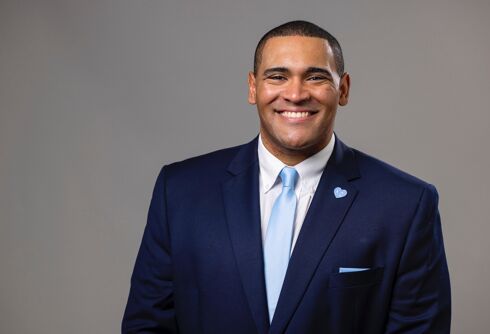For most of the pandemic, I’ve made a pitcher of lemonade every week. It began a couple of weeks after the murder of George Floyd and the subsequent unrest that righteously erupted.
Many of the grocery stores within the city limits were damaged, destroyed or closed out of fear. So, I started taking a weekly drive to a neighboring suburb to go to Fresh Thyme Market. It was a new shopping experience for me that inspired me to eat healthier – more fruits and vegetables you know?
Related: Andrea Jenkins is one of the first Black, trans elected officials. She’s building bridges.
One trip in July, the lemons caught my eye. I love lemonade, but usually never had much time to make it at home, or at least I thought I didn’t.
Never Miss a Beat
Subscribe to our newsletter to stay ahead of the latest LGBTQ+ political news and insights.
I had forgotten how simple the process was. I’d throw in a few berries from time to time. I would top off a cup of tea before going to bed or mix lemonade with sparkling water when I wanted a few bubbles with dinner.
Lemonade was the favored beverage of the Deep South, and Black women brought the tart elixir with them during the “great migration” to the North. One day it occurred to me that as the city council member representing the district where George Floyd was murdered amid a global pandemic, I had been given a proverbial bowl of lemons.
To be clear, I not only represent the area, I also live two blocks from the now infamous Cup Foods that is prominently in the frame every time the horrific image of George Floyd being murdered is played on the nightly news.
I watched as hundreds of thousands of people made their way to what is now George Floyd Square to pay homage, protest or just be with community in those difficult days. People traveled from all over the country, all over the world in fact. This went on for months, the international media was a constant presence, helicopters buzzing overhead night and day.
For many people the situation seemed hopeless, but as a Black, trans-identified woman I knew that the struggle is indeed real, and that progress is possible.
When enslaved Black women got lemons, they made lemonade. When they were given the intestines from a slaughtered hog, they made chitterlings, they made delicacies from the hog’s nose and feet.
In short, Black women have always made a way out of no way. Similarly, Black trans people created their own societies and social structures through what we know now as “Ball Culture.” The world was given a glimpse into this culture through the Emmy-nominated hit show Pose.
So I am part of multiple resilient communities, communities that still have to make proverbial lemonade just to get out of bed and face the world every day.
You know the thing that has most distressed me about Dave Chappelle’s diatribes? Beyond being called those “alphabet people,” clever but not really funny, or his proclamation that “I’m team TERF,” an acronym that stands for trans exclusionary radical feminist, the thing that hurt me the most was the insinuation that being L,G,B and particularly Transgender is somehow exclusively a white phenomenon.
This completely erases Black trans identity. I know Dave did a critically acclaimed special called “8:46” about George Floyd’s murder. I really wish he’d donate some of those earnings to the community where that tragedy occurred, but that’s another story.
But I wonder if he knows that here in Minneapolis, ground zero, Black, queer, trans and gender non-conforming folks were at the forefront leading the efforts for change, organizing the marches and protests, collecting signatures on behalf of a Black man.
The same is true when Michael Brown was shot dead in St. Louis. Black, queer, trans and gender non-conforming folks were once again on the frontlines. It is well known that Patrisse Cullors, Alicia Garza and Opal Tometti (queer and allied Black women) coined the phrase that consequently kicked off the Black Lives Matter movement.
Black LGBTQ folks have historically been at the forefront of the fight for human rights, for civil rights. Folks like Bayard Rustin, James Baldwin, and Marsha P. Johnson. Folks like myself making history in politics. We must begin to recognize that Black LGBTQIA(+) identified people are making Black history.
When we allow the false narrative that Black trans people don’t exist, don’t matter, we are creating a dangerous environment that puts already vulnerable and marginalized lives at even further risk.
This Black History Month, I am asking that we remember the more than 50 mostly Black and Brown trans women murdered in 2021.
Think about the fact that 40% of all homeless youth identify as LGBTQ, many of them Black and Brown.
Already in 2022, Amariey Lej, 20, and Duval Princess, 24, were the first two transgender individuals to suffer violent deaths. Both women were shot to death.
Remember that Black LGBTQIA(+) history is Black history. Now go make some lemonade because we’ve got a whole lot of work to do.
Andrea Jenkins is the President of the Minneapolis City Council. She’s the first out Black trans woman elected to public office in the United States.
Don't forget to share:














